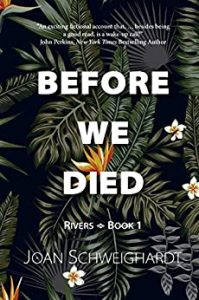Becoming Jack Hopper
Becoming Jack Hopper
(Disclaimer: Nothing I say here will be politically correct)
By Joan Schweighardt
 I had a penchant for writing from multiple points of view from the get-go, but as most of my characters were women, I never had to sustain my “maleness” throughout an entire book. My first first-person male was an English professor. I was a teaching assistant in those days, but the building that included my office was full of professors, almost all of them male. They had some things in common, those lovely men jousting to see who could sneak the greatest number of Faulkner-isms into a simple morning greeting, and I could not resist working a fictitious representation of them into my first novel.
I had a penchant for writing from multiple points of view from the get-go, but as most of my characters were women, I never had to sustain my “maleness” throughout an entire book. My first first-person male was an English professor. I was a teaching assistant in those days, but the building that included my office was full of professors, almost all of them male. They had some things in common, those lovely men jousting to see who could sneak the greatest number of Faulkner-isms into a simple morning greeting, and I could not resist working a fictitious representation of them into my first novel.
I grew bolder with my second novel. The male narrator in that one, a disciple of Robert Bly and the father in a darkly humorous story about a dysfunctional family, takes up drumming so as to encourage his machismo to rise up and go to war with the softer aspects of his personality. In my third and fourth novels, there are plenty of men, but they are described through the eyes of female narrators (a boon when it came to Attila the Hun).
My fifth novel, The Accidental Art Thief, features a different kind of man than the ones I had written in the early days. Frankie Winesky is the brother of the protagonist, Kathryn—or as her family calls her, Zinc. With no place to go after she is cast out of the only home she has known for the last 25 years, Zinc appears on Frankie’s doorstep, with her two unruly dogs in tow. Frankie, a car mechanic who drinks too much and watches porn, is not happy to see her. He only gets away with his often abusive behavior toward her because A, he’s likeable in spite of his bad habits and sharp tongue; B, he breaks down and tells the reader his painfully honest story of love lost; and C, there are two other men in the book (both denied first-person narration rights) who are much worse.
My male characters have ranged from self-absorbed intellectuals to bastards who treat women badly and get theirs in the end. No, that doesn’t mean I think all men are one or the other, but yes, I confess I had a little fun writing those who are. The context for these male characters was playful—until I got to the Attila book (titled, The Last Wife of Attila the Hun) of course. I was a playful writer. I know lots of great men, and I also know the ones I’ve written about.
But all that changed when I began writing Before We Died, the first book in my recently completed Rivers Trilogy.
Before We Died is about two brothers, Irish American dock workers from Hoboken, NJ, who, in the year 1908, leave home to make their fortune tapping rubber trees in the South American rainforest. There are women in the book too. Nora, the love interest of both brothers, sees them off as they embark on their journey and awaits their return. She also appears in flashbacks while the brothers are in the jungle. Additionally, the brothers meet various women in Manaus, Brazil, the gateway for all men going into the deep rainforest during the rubber boom. Two of these women will impact their lives in ways they cannot foresee at the time (and will thus show up in the next two books in the series). Still, the gist of the story is with the brothers, Jack and Baxter Hopper.
I wrote draft one of Before We Died in third person limited, from the perspective of one of the brothers, Jack. When I reread it, it occurred to me that I was missing a great opportunity, because Jack’s first-person voice would be so much more vibrant than that of the author. But writing an entire novel from a first-person male perspective—and an 18-year-old dockworker from a rough immigrant neighborhood in the early 20th century, at that—would, I knew, require an even greater investment in a story that had already required me to immerse myself in a very specific historical moment. It would oblige me to become Jack Hopper.
I began my effort with language of course. Since Jack and Baxter’s parents were predominately Irish-speaking before emigrating to America and beginning to learn English in their early 20s, it’s likely that their sons, born in America in the years just after their arrival, would revel in some of those Irish-isms and slang picked up at home. Slang was popular at the turn of the century, especially among men working on the docks. In fact, in researching early 1900s slang in the New York metro, I learned that the Irish contributed more to it than any other immigrant population.
Though neither brother is educated beyond high school, Jack is the reader in the family, and his use of colorful language is somewhat tempered by that fact. But his brother, Bax, the person Jack most often converses with, goes full out whenever he has the opportunity to do so. Baxter is vivacious by nature. Often he is bombastic. He is the ringleader, the troublemaker who paves the path that his younger brother often finds himself following.
The language Jack and Baxter Hopper use is not so much blasphemous as it is naughty. For instance, when Jack reflects on his near starvation in the jungle, he says, “I could have eaten the arse off a horse if I’d had me one.” His vulgarity is useful not only for character development but also because it provides some drollery in what is at heart a dark story. Still, it took some effort initially to cross the red line into Jack’s vernacular. But by the time I was on the third draft, I had the hang of it. I had committed myself to it, and because I believe that the language the Hopper boys use in the novel is pretty darn close to the language two turn-of-the-century Irish American dockworkers would have used “in real life,” I began to imagine I was, on some level, becoming Jack Hopper.
But then my friend, Rocco, a philosopher and a fabulous writer whose male characters operate directly from the gut, asked me this question: Why does your protagonist clench his fists when he’s being told that he’s not going to be paid for work he’s risked his life to accomplish?
I was dumbfounded. I hadn’t realized any of my male characters were fist-clenchers, let alone the narrator. I was ashamed. I could almost see the mobs of burly early-20th century dockworkers and rubber tappers turning from their work to have themselves a laugh at my expense. Yes, I had learned to cuss with the best of them, but it was all smoke and mirrors. My male characters remained wimps!
Thereafter I thought about being a man all the time. I mean, I really thought about it. I observed my reactions to events large and small, and then compared them to the reactions my husband and sons had to the same events. And then, because my husband and sons are all three gentle men (relatively speaking), I multiplied their reactions times five to try to get back to the reactions of a 20th century dockworker from a rough immigrant neighborhood. I talked to Rocco, or rather he talked to me, about what it’s like to be so angry that you can feel fire catching in your balls. I’d never thought of anger that way; it was a revelation. I pictured it. Eventually I felt it, in some way too complicated to explain. But most importantly, I inadvertently gave myself full permission to dive in and take my chances with a new bolder approach to manhood. I went back to the drawing board and completed the final draft.
It’s been a while now since I finished that manuscript. My publisher liked it and it garnered some great endorsements from other authors. I was feeling pretty good about the reception it was likely to receive in the review world. And so it was that when my first NetGalley reviewer admitted she’d only read a fifth of the book—because the “locker room” talk was not her cup of tea—I was fairly devastated.
The words echoed in my head for a day or two. No one had ever referred to my writing as locker room talk before. But then I had the revelation I should have had from the start: The reviewer’s reaction was proof positive that I had succeeded in what I’d set out to do. Locker room talk, according to Urban dictionaries, “exists solely for the purpose of male comedy and is not meant to be taken seriously.” That’s the Hopper brothers to a T. You could say their banter is their way of showing their affection for each other. It will work for some readers and not for others; I can accept that.
I loved the experience of writing Before We Died. It began with two trips to the South American rainforest, progressed to the great joy of immersing myself in an array of relevant research, and ended with the eye-popping experience of becoming Jack Hopper. But in many ways it was exhausting. The second and third books in the trilogy, Gifts for the Dead and River Aria, are, happily, narrated by women
About the books:
Collectively the three books in the Rivers series cover the years 1908 to 1929 and concern two different groups of people: an Irish American contingent living in New York and New Jersey and an Amerindian/European contingent from Manaus, Brazil. Book one, entitled Before We Died, begins with the two Irish American brothers leaving New Jersey because they have heard that rubber tappers in South America are making a lot of money, and they want to try their hand at it. The results of their effort are tragic, and when one of the brothers returns home without his sibling, relationships among the Irish American contingent must bend and shift accordingly, which happens over the course of the second book, Gifts for the Dead. In book three, River Aria, a young woman—the product of an affair one of the brothers had back in book one—travels from Brazil to New York with a companion in the hope of finding success in the world of opera.
About Joan:
Joan Schweighardt  is the author of nine novels, two memoirs, two children’s books and various magazine articles, including work in Parabola Magazine. She is a regular contributor to Occhi Magazine, for which she interviews writers, artists and filmmakers. In addition to her own projects, she has worked as an editor and ghostwriter for private and corporate clients for more than 25 years. She also had her own independent publishing company from 1999 to 2005. Several of her titles won awards, including a Barnes & Noble “Discover Great New Writers,” a ForeWord Magazine “Best Fiction of the Year,” and a Borders “Top Ten Read to Me.” And she has agented books for other writers, with sales to St. Martin’s, Red Hen, Wesleyan University Press and more.
is the author of nine novels, two memoirs, two children’s books and various magazine articles, including work in Parabola Magazine. She is a regular contributor to Occhi Magazine, for which she interviews writers, artists and filmmakers. In addition to her own projects, she has worked as an editor and ghostwriter for private and corporate clients for more than 25 years. She also had her own independent publishing company from 1999 to 2005. Several of her titles won awards, including a Barnes & Noble “Discover Great New Writers,” a ForeWord Magazine “Best Fiction of the Year,” and a Borders “Top Ten Read to Me.” And she has agented books for other writers, with sales to St. Martin’s, Red Hen, Wesleyan University Press and more.
Her most recent work is the Rivers Trilogy—Before We Died, Gifts for the Dead and River Aria—which move back and forth between the New York metro area and the South American rainforests between 1908 and 1929.
RIVERS TRILOGY, Joan Schweighardt
 The historical moment that ignites all three novels in the Rivers Trilogy is the South American rubber boom, which hit its peak in Brazil in the early 20th century.
The historical moment that ignites all three novels in the Rivers Trilogy is the South American rubber boom, which hit its peak in Brazil in the early 20th century.
The three books in the Rivers series cover the years 1908 to 1929 and concern two different groups of people: an Irish American contingent living in New York and New Jersey and an Amerindian/European contingent from Manaus, Brazil. Book one, entitled Before We Died, begins with the two Irish American brothers leaving New Jersey because they have heard that rubber tappers in South America are making a lot of money, and they want to try their hand at it.
The results of their effort are tragic, and when one of the brothers returns home without his sibling, relationships among the Irish American contingent must bend and shift accordingly, which happens over the course of the second book, Gifts for the Dead. In book three, River Aria, a young woman—the product of an affair one of the brothers had back in book one—travels from Brazil to New York with a companion in the hope of finding success in the world of opera.
BUY HERE
Category: Contemporary Women Writers, On Writing

























